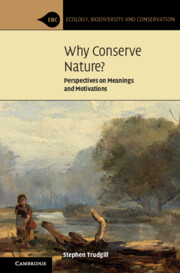Book contents
- Why Conserve Nature?
- Ecology, Biodiversity and Conservation
- Why Conserve Nature?
- Copyright page
- Dedication
- Contents
- Foreword
- Preface
- Part I The Experience of Nature
- 1 The Experience of Nature
- 2 Climate Change
- Part II Nature Imagined
- Part III Nature, Self and Place
- Part IV Why Conserve Nature?
- Bibliography
- Index
2 - Climate Change
from Part I - The Experience of Nature
Published online by Cambridge University Press: 03 February 2022
- Why Conserve Nature?
- Ecology, Biodiversity and Conservation
- Why Conserve Nature?
- Copyright page
- Dedication
- Contents
- Foreword
- Preface
- Part I The Experience of Nature
- 1 The Experience of Nature
- 2 Climate Change
- Part II Nature Imagined
- Part III Nature, Self and Place
- Part IV Why Conserve Nature?
- Bibliography
- Index
Summary
The quotation “Civilization is in a race between education and catastrophe” is attributed to the writer H. G. Wells (1866–1946). While often quoted, the actual source of the quotation seems elusive, but I feel that it is relevant here. However, in the context of climate change, as in many other contexts, ‘education’ is much more than about being informed. It is also about ‘education to be wary’ – wary of the easy narrative, the received wisdom, the manufactured dissent and the fact that nothing enhances self-justification as much as a bogeyman – whether an actual person or an assumed problem. Further, I would add ‘education to think carefully’, to question, to realise that you might be being manipulated, to realise how you are being positioned, to read widely, to gain as many views as possible, to be open and to think for yourself. H. G. Wells continued, “Let us learn the truth and spread it as far and wide as our circumstances allow. For the truth is the greatest weapon we have.”
- Type
- Chapter
- Information
- Why Conserve Nature?Perspectives on Meanings and Motivations, pp. 63 - 106Publisher: Cambridge University PressPrint publication year: 2022

